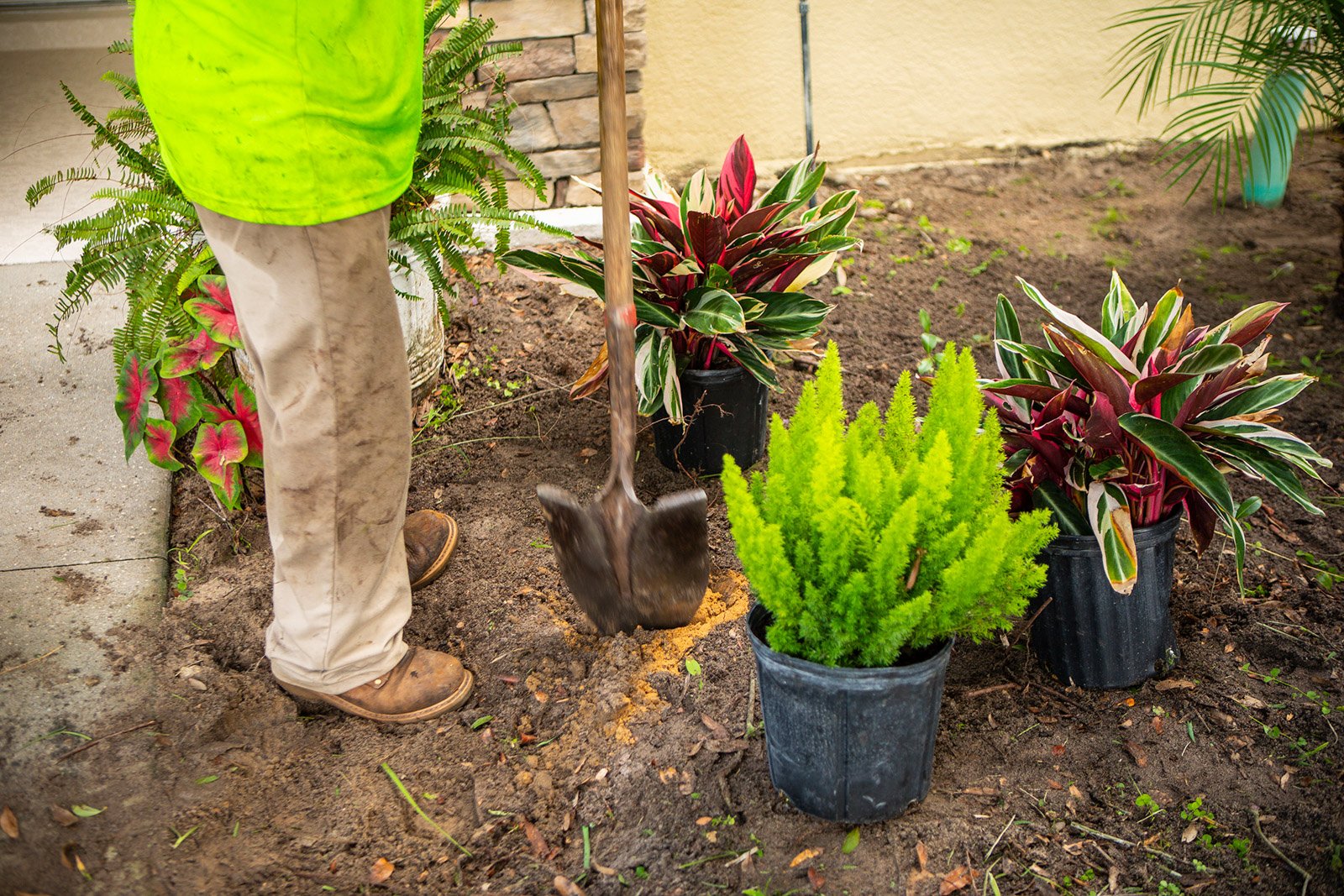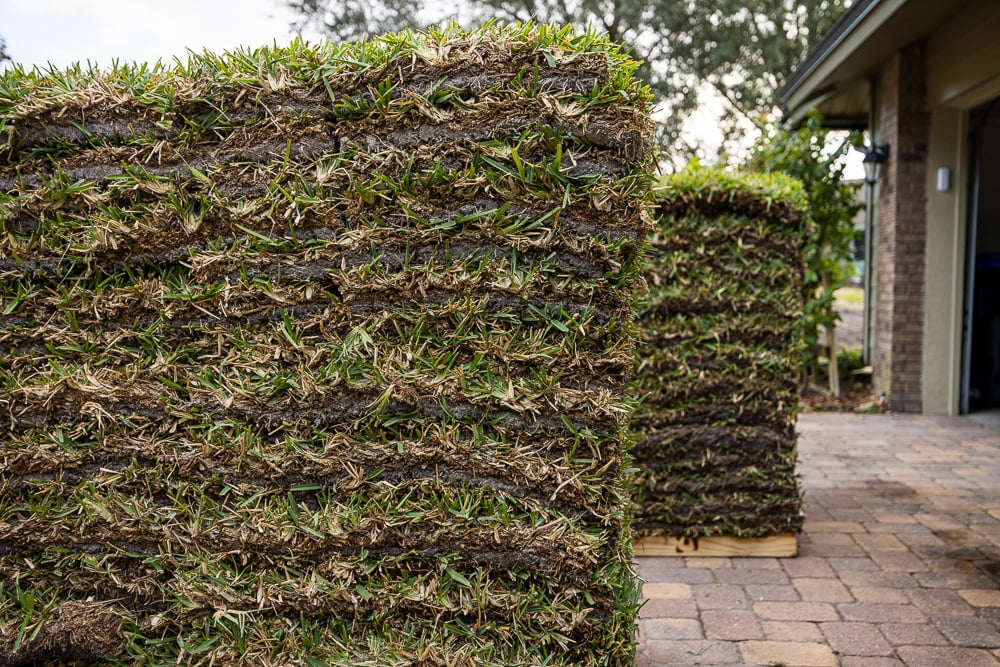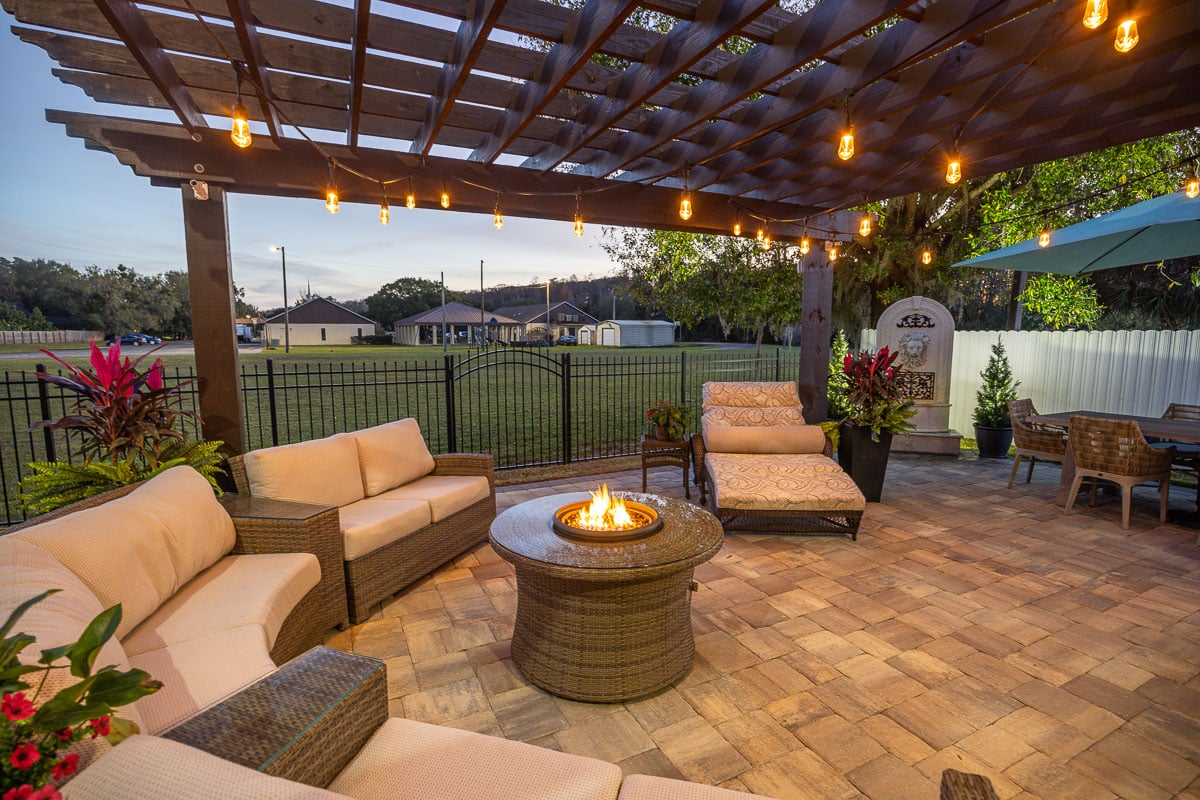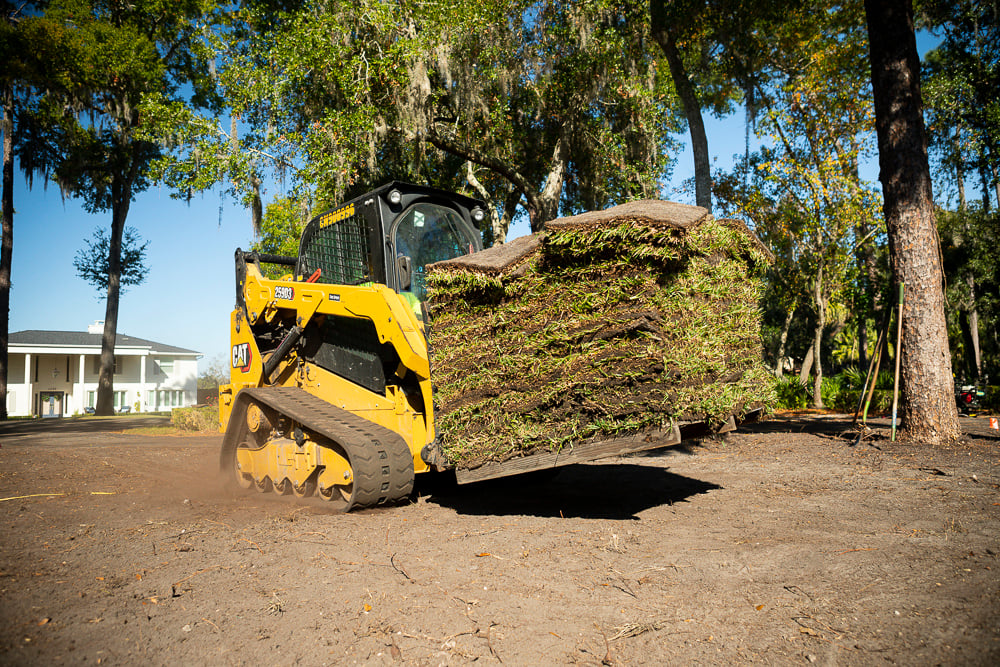Some pros and cons are obvious, like with pizza, for instance. Actually, that's a bad example. Pizza has no cons.
What about sod? What are sod pros and cons?
Well, the benefits include an instant healthy green lawn; erosion prevention; no weeds; and fresh, green sod can be conveniently delivered straight to your door.
But there are drawbacks, too, including its expense and high maintenance needs until it gets established. New sod needs a ton of water.
Keep reading to learn more sod basics, including:
- What is sod, exactly?
- The advantages of sod
- Sod drawbacks
- What’s the best sod for Florida?
- What are some sod alternatives?
What is Sod, Exactly?
Sod is living turf grass that has already been planted by seed on a professional sod farm, then harvested 10 to 18 months later by slicing off a very thin layer of topsoil.
The sod with grass, its roots, and a layer of moist soil attached is rolled or stacked on the farm then sold to be transplanted into waiting yards. Sod farmers grow different types of sod, focusing on varieties that thrive in their area.
The Advantages of Sod
There’s lots to love about sod. A few cool sod facts:
It’s an Instant Healthy Green Lawn
Sod grass is healthy, professionally grown and nurtured under the best conditions. It’s been planted in the best soil, regularly fertilized and has received plenty of water. The best sod farms also treat their sod for sod webworms. These pests lay their eggs in the sod, and when they hatch, the larvae devour your grass. They’re bad news.

If your existing lawn is thin, weedy and full of bare spots, a new sod lawn offers an instant renovation. It rolls out like a luxurious green carpet. Instant happiness.
Here in Florida, Sod is Easier Than Seed
Many Florida landscaping companies don’t even plant lawns from seed — they only install sod lawns. Why? Seed takes a long time to grow into a thick, healthy lawn, while sod is instant gratification.
Lots of things can ruin your best-laid seed plans, from too much rain to wind to hungry, seed-gobbling birds.
With sod, the farmer has already done the hard work of growing the healthy grass for you. It’s ready to go.
Sod Fact: It Prevents Erosion
Bare soil washes away in the rain. A sod lawn prevents that.
New construction leaves behind an expanse of bare soil that quickly turns to a muddy mess in the rain, or a dusty mess in dry weather.
Sod solves both problems.
Sod Can Be Installed Year Round
Sod installation and delivery in Central Florida can happen practically any time of the year, unless the ground is frozen. Its roots are already developed, so sod grass can get established in prepared soil no matter the time of year.
Sod Arrives Free of Weeds
Older lawns struggle with weeds. A new sod lawn lets you start from scratch, weed-free. New sod is thick and dense, so there are no bare spots where weed seeds can take hold.
It Can Be Delivered Right to Your Door
You can install a new sod lawn yourself or have it professionally installed. Either way, the fresh new sod is delivered right to your yard.

Sod Pros and Cons: A Look at the Cons
While sod is the king of new lawns here in Central Florida, there are some disadvantages:
It Needs A Lot of Attention at First
New sod requires a lot of water for the first few weeks until it’s established. The watering schedule can be daunting. The first week requires watering three times a day, and new sod needs frequent attention for the first few weeks while the roots get established.
The Expense
A new sod lawn costs between $190 and $290 per pallet of sod, depending on the sod species. One pallet covers 400 square feet. Seed is cheaper, but you won’t get an instant, green, thriving lawn.
It Has to Be Installed Right Away
You can’t order new sod for delivery then decide to go fishing and get to it later.
One of the most important sod facts: sod has to be installed as soon as possible after it’s harvested — the same day is best.
Never buy squares or rolls of sod from a large home and garden store. It’s likely been sitting there for more than a day, and may not root well.
What’s the Best Sod for Florida?
The best sod for Florida is typically varieties of St. Augustine and Zoysia, with a couple exceptions for specific situations.

Bermuda grass is great for erosion control, but can be invasive. Bahia isn’t attractive, but is about as low maintenance as real grass gets.
What About Sod Alternatives?
Not sure sod is your best option? There are plenty of other ways to cover bare ground:
Artificial Turf
Artificial turf is a surface of synthetic fibers made to look like natural grass. The ultimate in low-maintenance lawns, it doesn’t need mowing, watering or fertilizing.
It even comes in different blade lengths and widths, colors and textures, like real grass, so you can choose the look you like.

It’s a great sod alternative if you want a great-looking lawn with curb appeal — and no maintenance worries.
But synthetic grass is considerably more expensive than natural grass.
A lawn that might cost $1,000 in natural sod will cost about $8,000 in artificial turf.
Groundcovers
Groundcover plants cover your bare soil, look attractive and need less maintenance than sod.
A couple good sod alternatives for Central Florida:
Mondo Grass
A great Florida alternative to sod that never needs mowing, mondo grass grows well in almost any soil and light conditions.
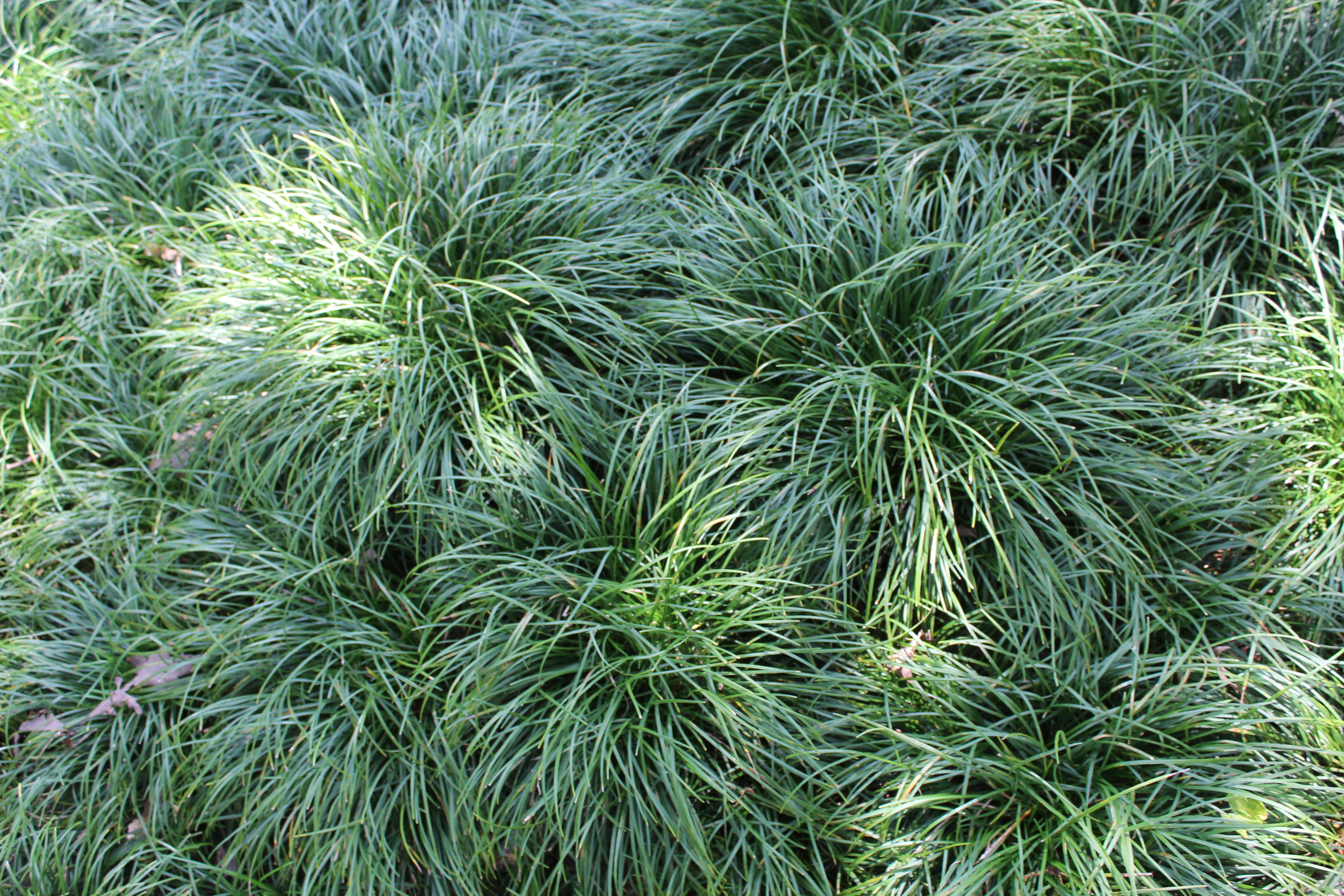
It’s not actually grass, but its grass-like strappy foliage forms dense tufts that slowly spread over time.
Liriope
Also called lilyturf, it’s an easy-care vigorous grower that spreads fast into a carpet of green and is happy in most any growing conditions.
While many varieties grow taller than a turf lawn, as high as 18 inches, one variety, “NoMo,” grows 3 to 6 inches tall and feels like grass underfoot.
Hardscape
Not sure you want the upkeep of a sod lawn but you want great usable outdoor living space?
How about a multi-tasking paver patio? Or patios?
A landscape designer can help you create a custom patio space to perfectly suit your lifestyle, even creating separate spaces for different activities.

Have a patio for dining, one for lounging, one tucked away from the house a bit, with a pergola or fire pit.
How about steps, terraces, and seating walls? Bonus: patios don’t need mowing.
Talk to Your Landscape Designer
A skilled landscape designer will help you figure out what works best for your outdoor space and your lifestyle.
Chat about sod pros and cons; different sod species and alternatives to sod.
They’ll make it easy.
Ready for Sod Installation & Delivery in Central Florida? Trust Ground Source
You can’t beat a new sod lawn. One day, you’re unhappily surveying a big expanse of dirt or a weed-infested lawn, the next you’re wiggling your toes in a lush green carpet of healthy grass.
Our sod is cut fresh the day it’s scheduled for delivery to you, not stashed on a pallet somewhere baking in the sun. It’s fresh and ready to make a great transition to your yard, whether you plan to install it yourself or call on Ground Source pros to handle the dirty job for you.
Once we install your new sod lawn, we don’t just say “see ya” and drive away.

We give you a detailed sod care guide. You’ll know what times to water, for how long, and even which of your irrigation heads to use for what amount of time.
We’re sod experts, but our skills don’t stop there. We’re with you every step of the way as you plan your perfect outdoor space.
Sod, irrigation, landscape design: Let us transform your yard to a place you spend every spare minute.
Are you ready to enjoy the vibrant, impressive yard you've always wanted? Request a quote today! We’ll help you review your options and then transform your property.




